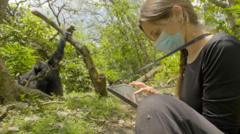In the heart of Virginia's mountainous regions, a unique initiative is taking root as local farmers work tirelessly to restore a forest economy centered on herbal supplements and remedies. This effort not only contributes to economic sustainability but also seeks to revive the cultural heritage that defines Appalachia.
Dr. Ryan Huish, a biology professor at the University of Virginia’s College at Wise, demonstrates this innovative approach. On a sunny afternoon in April, he guided a group of students through his family's 60-acre property in Duffield, introducing them to a rich variety of medicinal herbs, such as ramps, trout lilies, and even Appalachian wasabi. These plants hold centuries of history, once integral to the local economy and used for food and medicine.
However, the herbal market has traditionally suffered from inadequate regulation, leading to challenges like underpricing and overharvesting. Katie Commender, director of the Appalachian Harvest Herb Hub, highlights these concerns, noting that the trade of forest botanicals has persisted for 300 years, but there is worry that these traditions are fading as they struggle to transition to younger generations.
Recognizing the need for greater sustainability, local farmers have come together, engaging in cooperative efforts to enhance the quality and regulation of their products. This grassroots endeavor not only aims to improve the economic viability of herbal businesses but also serves to educate the community on the importance of these native plants.
As this initiative unfolds, it represents a beacon of hope for preserving Appalachian heritage while fostering a robust agricultural economy that embraces both history and innovation. By tapping into the region’s rich biodiversity, farmers are paving the way for a more sustainable future for forest botanicals.
Dr. Ryan Huish, a biology professor at the University of Virginia’s College at Wise, demonstrates this innovative approach. On a sunny afternoon in April, he guided a group of students through his family's 60-acre property in Duffield, introducing them to a rich variety of medicinal herbs, such as ramps, trout lilies, and even Appalachian wasabi. These plants hold centuries of history, once integral to the local economy and used for food and medicine.
However, the herbal market has traditionally suffered from inadequate regulation, leading to challenges like underpricing and overharvesting. Katie Commender, director of the Appalachian Harvest Herb Hub, highlights these concerns, noting that the trade of forest botanicals has persisted for 300 years, but there is worry that these traditions are fading as they struggle to transition to younger generations.
Recognizing the need for greater sustainability, local farmers have come together, engaging in cooperative efforts to enhance the quality and regulation of their products. This grassroots endeavor not only aims to improve the economic viability of herbal businesses but also serves to educate the community on the importance of these native plants.
As this initiative unfolds, it represents a beacon of hope for preserving Appalachian heritage while fostering a robust agricultural economy that embraces both history and innovation. By tapping into the region’s rich biodiversity, farmers are paving the way for a more sustainable future for forest botanicals.





















